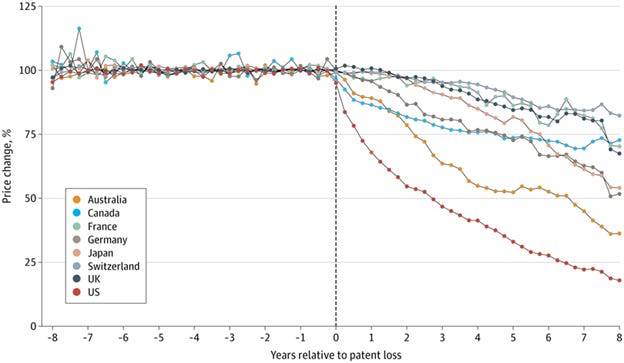The US enjoys low generic drug prices
August 26, 2024
Decrease in drug price after patent expiration
Source: Serra-Burriell, et al JAMA Health Forum August 14, 2024 LINK
We often talk about the high cost of pharmaceuticals in the United States. Costs of brand name drugs in the US are over four times higher than in other high resource countries. However, the US often has lower priced generic drugs than other high resource countries.
Research published in JAMA Health Forum used drug pricing data from 8 high resource countries (Australia, Canada, France, Germany, Japan, Switzerland, UK and US) to simulate whether ignoring the lower prices of drugs when they become available as biosimilars or generics leads to an underestimation of the value of pharmaceutical products in pharmacoeconomic research.. They found that for drugs that have years left on their patents, the future price drops had little impact on cost effectiveness. However, considering future generic prices helped increase the calculated cost effectiveness of medications for drugs that were close to the end of their patent exclusivity.
But I’m more interested in the graphic above. Generic medications are an exceptionally “good deal” in the US, based on the much higher prices paid here for brand name medications. Eleven states have laws that encourage pharmacists to dispense generic medications, and generic use is higher in these states.
Implications for employers:
- Generic medications represent a good value and employers should design plans to encourage generic prescribing when available.
- Employers and consultants can be alert that in some instances “spread pricing,” when the PBM charges employer clients more than what it pays to the pharmacy for an inexpensive generic drug, can erase some of the generic drug price advantage.
- Efforts to enforce patent law, such as the FTC initiative to invalidate inappropriate patents for delivery devices, can help plan sponsors benefit from earlier introduction of generic medications.
Thanks for reading. You can find previous posts in the Employer Coverage archive
Please subscribe, “like” and suggest this newsletter to friends and colleagues. Thanks!
Tomorrow: US women’s health falls short in international comparisons

